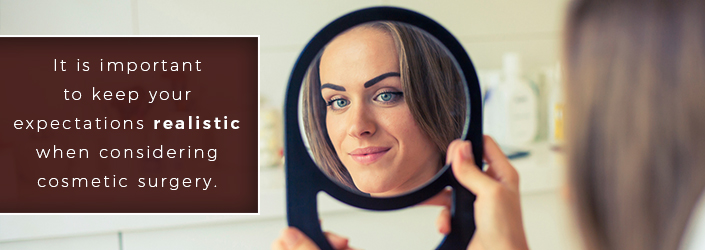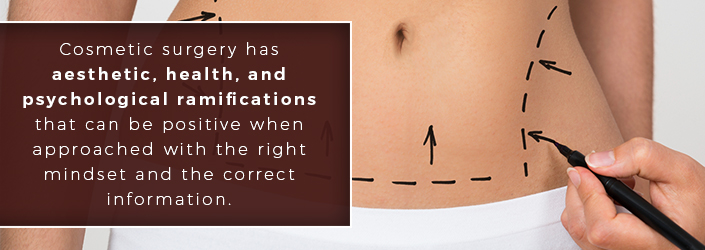What You Should Know When Deciding on Plastic Surgery
Plastic surgery was once considered the exclusive domain of the rich and famous. Models and movie stars made up the majority of the patients, and news of their nose reductions and breast augmentations made the gossip columns. Today, cosmetic surgery is used to correct a number of conditions, many of which are less about appearance and more about health.

The popularity of cosmetic surgery has increased dramatically over the last 15 years. Between 2000 and 2015, the number of breast lifts alone has increased 89%. The numbers for liposuction have increased by 5% from 2014, and botox may have only increased by 1% from 2014, but it’s gone up over 750% since 2000.
Other soft tissue fillers have also gone up-a 6% increase over 2014 and more than 270% since 2000. The field of cosmetic surgery is also seeing a surge in reconstructive procedures, tumor removals, scar repairs as well as facial and hand surgeries, too.
Deciding on Plastic Surgery
Cosmetic surgery is a big decision that can alter your body, and potentially your life, forever. Cosmetic procedures are primarily elective surgeries, which means there is no physical need for them. The main purpose is to change the look of your body, but there can also be some physical or psychological benefits.
For some people, there is a strong psychological desire to make a change to their appearance. People who are born with cleft palates or some other serious disfigurement often struggle to accept their own self-image. In addition, an accident or other life event might have changed something about your physical appearance.
Some people have a physical need for cosmetic surgery. Breast reductions, for example, can relieve back pain. Rhinoplasty may improve sinus functions, and there are a number of other cosmetic procedures that, in addition to changing your appearance, might reduce pain or enhance quality of life.
Some factors to consider before deciding on plastic surgery include:
-
- Expense. Cosmetic surgery, since it is considered elective, is usually not covered by insurance. The costs can vary greatly based on the type of procedure and the quality of care. All surgeries, especially those that require general anesthesia, come with risks. The price tag on your cosmetic surgery doesn’t guarantee the quality of the work you receive, but surgery of any kind is not something you want to be cheap about. The nose you think is too big for your face might be a whole lot better than a cut-rate nose job that doesn’t end well. If your procedure requires follow-up work, it will be an additional expense. Consider the costs and the value of potential outcomes before deciding that cosmetic surgery is right for you.
-
- Recovery. In addition to money, many people don’t have much time to spare. Recovery from cosmetic surgery may take a long time, anywhere from a couple weeks to a couple months or more. During that time, you may not be able to perform the regular activities of your daily life. You might have to take an extended absence from work. Most cosmetic surgery results in bruising and pain around the surgery site, which is normal and will heal eventually, but it could be unsightly during the recovery process.
-
- Risk. Any time you undergo surgery, there is risk involved. General anesthesia affects vital organs as well as your brain, and surgery sometimes reveals unknown conditions. With cosmetic surgery, there’s always the possibility that you won’t like the outcome. Usually the only remedy is another surgery to change it. There is also the risk of contracting an infection, which remains a risk until the tissue is fully healed. Be sure you are in good physical health, tell you surgeon about your medications or health issues and take your post-op antibiotics to reduce risks of any procedure.

-
- Expectations. It is important to keep your expectations realistic when considering cosmetic surgery. Your looks can be improved, but perfection is subjective. Plus, your body will continue to grow and age after the surgery, so the results you obtain may not be permanent. The most unrealistic expectations of cosmetic surgery involve how it will change your life. Some people believe that if their nose were smaller or their breasts were bigger, their relationships will improve, they’ll receive a promotion, or they will become rich and famous. Projecting your expectations for cosmetic surgery beyond the physical changes is unrealistic and can be disappointing.
-
- Viability. Not everyone is a good candidate for cosmetic surgery. There are a number of psychological risks you should be aware of. It is possible to become addicted to plastic surgery. One small procedure leads to another and the next thing you know, your sense of self-worth is wrapped up in an outward image of you that was created by a doctor (or several doctors). Changing your outward appearance will not change who you are on the inside. Some cosmetic surgery patients struggle with this disconnect. It may be a good idea to explore your sense of self-worth with a counselor before deciding on plastic surgery. Body dysmorphic syndrome is a known psychological problem that can lead to the desire for multiple procedures. There are also physical health conditions that may mean you are not a candidate for cosmetic surgery.
Choosing a Plastic Surgeon

Deciding on cosmetic surgery is a big step, but once you know it is the right decision for you, it’s important to find a worthy surgeon. There are plenty to choose from, and this area of medicine that was once reserved for the rich and famous is now accessible to almost everyone. There are doctors and surgery centers in most communities.
Here are some factors to consider when choosing a plastic surgeon:
-
- Credentials. Above all else, your surgeon should be properly educated and licensed. It’s not safe to subject yourself to cosmetic work of any kind by an unqualified practitioner. Surgeons are licensed by state, but most states do not require the training and practice to be in the same area. Therefore, a state licensed surgeon is a generalist who may or may not be trained specifically in cosmetic surgery. To ensure the right specialization, trust a surgeon who is certified by the American Board of Plastic Surgery, and a member of the ASPS and the ASAPS.
-
- Facility. Cosmetic surgery is completed under general anesthesia and carries all the same risks as general surgery. Be sure your doctor operates in a clean and safe facility for such a procedure. One of the biggest risks in surgery is the anesthesia, so research the credentials of the anesthetist. Also, be sure the facility is equipped to handle emergencies. No one wants to think about anything going wrong during surgery, but if an emergency arises, the operating facility should be able to accommodate any advanced life support measures needed. Check the credentials on the operating facility to determine its level of certification. Office based procedures including Botox, dermal fillers, liposuction and non-invasive fat reduction should be performed by a plastic surgeon or under the direct supervision of a plastic surgeon. The office should follow sterile procedures and have appropriate measures in place for emergencies.
-
- Referrals. Any time you hire a specialist, ask for referrals from people you trust. This is a good way to narrow the field and focus on doctors who have shown good results. In addition to referrals from friends, you should look at the doctor’s work. Cosmetic surgery is mostly about appearance, so be sure you like the look of the surgeon’s work. You can request some photos when you interview potential surgeons for your procedure. You can also ask to speak with patients who have had the procedure you are considering.When looking at a plastic surgeon’s work, compare it to your own features. Consider whether the patient in the photo has a similar bone structure to yours and then think about how you would feel with similar results. Comparing results from patients who are similar to you in age and other features is important. For body procedures, look for samples of the doctor’s work completed on people with a frame that resembles yours.
-
- Experience. Your plastic surgeon should be experienced in the specific type of procedure you are considering. Surgery is a specific area of medicine, and within that there are specialties. Like any other skill, when someone repeats the same procedure over and over again, they become skilled at it. They develop strategies to enhance the outcome, and they know what to expect and how to deal with conditions that arise. No matter how prepared a surgeon is before the operation, there is always a chance he or she will encounter something unexpected once the procedure begins. A surgeon who is experienced in a specific type of surgical procedure will be adept at handling those contingencies.In addition to experience, you should trust a surgeon who performs procedures regularly. A surgeon who has completed 100 procedures in the last few years but now only operates once in a while is not the best choice. Medical procedures and equipment are constantly being updated. A surgeon who performs operations every week will know the latest techniques and be well versed in the procedure.
What to Know Before Plastic Surgery

Cosmetic surgery has aesthetic, health, and psychological ramifications that can be positive when approached with the right mindset and the correct information. It is not a quick fix, however, and should be very seriously considered. Here are a few reminders before undergoing plastic surgery:
-
- There are risks. Cosmetic surgery is still surgery, with all of the risks and potential dangers. No matter what the doctor tells you or how many people have successfully undergone the procedure, your experience could be different. When deciding on plastic surgery, consider the balance between the risks and the potential benefits.
-
- Know your procedure. Ask questions! It’s important to understand what procedure you are having and what is involved. You may think that a simple nose job is just that simple. In fact, it could involve taking cartilage grafting from other parts of your body or grafting skin from your hairline. Obtain the information about your procedure in advance, so you can be prepared for the complexity and length of recovery time.
-
- Surgery is not magic. Learn what it will take to realize the results you seek. If more than one procedure is required, are you up for it? What if the first procedure is tougher than you expected? Will you still be willing to go through with the rest? Plastic surgeons make it look easy, especially on television, but cosmetic surgery is complex. Be sure you understand the entire process before you get started.
-
- Results are not guaranteed. Plastic surgery is not the solution to all of your problems. Fixing your nose will not fix your life. Changing your appearance, or reducing your pain, can, however, facilitate positive changes in your life. Use cosmetic surgery as one of the many tools available to change your life in a number of ways. You need to do all of the other work, though, to support your journey toward your goals. Just having a new nose will not bring about peace in your world.

Ultimately, plastic surgery is a personal choice that affects your relationship with your own body. In many instances, you can conceal the fact that you have had plastic surgery. When the results look and feel natural, you are the only one who has to know. There are a whole range of procedures available to make small improvements that can have a big impact on the way you feel about yourself.
To learn more about cosmetic surgery and whether or not it is the right choice for you, contact Dr. de Ramón. A board certified plastic surgeon with years of experience, he will answer all of your questions and help you make the right decision for you. Your consultation, of course, is confidential and does not obligate you to move forward with a procedure. It will help you to learn about the options available to make the changes that are important to you.

